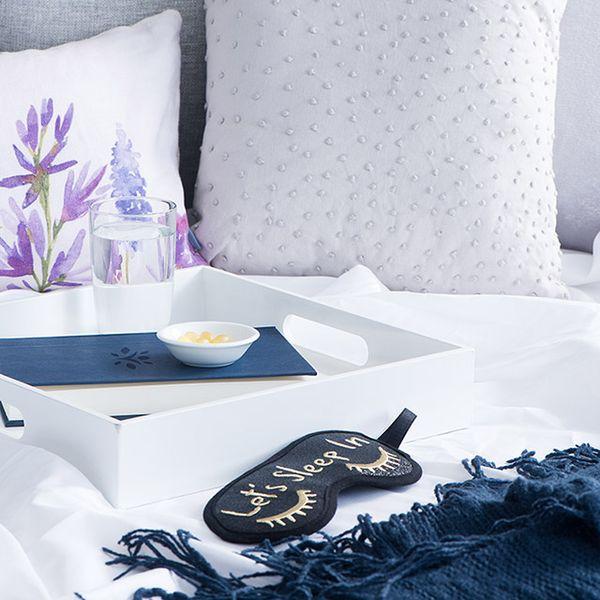Zealous About ZZZs Sleep Benefits & Sleep Hacks for Everyone
Just how important is sleep? It has the power to transform almost everything. Consider how you feel when you are sleep deprived, and envision millions of other people experiencing the same, driving their cars and making potentially life-altering decisions.
Pretty scary, right? Yet, it happens. According to a study published by the Centers for Disease Control and Prevention (CDC), about 30% of American workers sleep six hours or less each night, which equates to approximately 40 million sleep-deprived individuals.1
If everyone had sufficient sleep each night, we could see fewer accidents, fewer health issues, less irritability, increased productivity, and more. Moreover, well-rested individuals tend to have better memory retention, stronger immune systems, enhanced focus, healthier relationships, and generally make healthier choices compared to those who are sleep deprived.2
Benefits of Better Sleep
Better Health
Adequate sleep allows your body to heal, strengthens immune health, and reduces the risk of many health concerns.
Better Memory & Focus
Your brain processes and stores memories during sleep.3 Sleep is crucial for cognitive health and mental performance.
More Productivity
If your mind and body are not at their best, your productivity may suffer as well.
Healthier Relationships
Since sleep influences mood and judgment, it also impacts our relationships with others and our ability to remain composed and thoughtful even when emotions run high.
Better Food Choices
Lack of sleep may lead to cravings for unhealthy foods as quick fixes for low energy. Better sleep results in greater awareness of your food choices.
Do People Get Used to Feeling Sleep Deprived?
If so many of us are getting too little sleep, you might wonder how we cope. The answer is – barely. People who claim they can function just as well on minimal sleep may believe it, but reputable studies have demonstrated that this isn't the case. They simply don’t realize it, even when their performance is severely compromised. While people may grow accustomed to feeling tired daily and accept it as normal, they are accumulating a sleep debt that impairs their cognitive abilities.4
How Much Sleep Do We Really Need?
The amount of sleep you need varies widely among individuals and changes with age. It's never certain that you’re getting enough, so aim for the higher end of the recommended range if possible. Adults require between 7 to 9 hours a night. Sleeping less than 7 hours per night is linked to numerous health risks and impaired cognitive performance.5 Children and teens need even more – about 9 to 11 hours a night to support their developmental needs. Babies sleep between 16 to 18 hours daily.
Can Sleep Supplements Help You Sleep Better?
The time you spend in bed trying to sleep doesn’t always correspond to the amount of sleep you get. Sleep quality is just as important as pillow-time. If you have trouble falling asleep or frequently wake up during the night, your natural rhythms and crucial sleep stages may be disrupted. There are supplements that might help you sleep better. Below, we’ve listed our favorite sleep aid alternatives.
Supplements for Sleep
- Melatonin Supplements help restore your circadian rhythm (sleep and wake cycles) while providing your body with antioxidants
- Valerian Root promotes healthy mental relaxation, enabling better rest
- 5-HTP Supplements support sleep and might encourage mental and emotional well-being
- Lemon Balm Supplements may enhance body and mind relaxation for more restorative rest
- Magnesium Supplements for Sleep may help relax muscles, reduce tension, and calm the mind, supporting overall wellness and aiding in better rest
- Calcium aids the natural production of tryptophan and melatonin, which can assist you in falling and staying asleep
- Essential Oils aromatherapy essential oils, like lavender, sandalwood, rose, chamomile, ylang ylang, and frankincense, may promote relaxation and more restorative sleep6
How to Sleep Better: 10 Sleep Hacks for Everyone
Interested in establishing better sleeping habits? Here are 10 sleep hacks that everyone can use to achieve a more restful night's sleep.
- Get in Sync: Sync your body rhythms by maintaining consistent sleep and wake times each day, plus establishing a regular nighttime routine. Start a healthy nighttime habit, like drinking a relaxing herbal tea for sleep or powering down electronics, to signal to your body that it's nearly time for bed.
- Put Your Phone Down: Limit exposure to blue light from electronic devices, especially before bedtime, as it suppresses the natural production of melatonin.7 Additionally, blue light may negatively impact your eye health. Read more in About Blue Light and Eye Health.
- Skip the Booze: Though a nightcap might make you feel drowsy, it won’t improve your sleep quality. Alcohol consumption diminishes rapid eye movement (REM) sleep.8
- Exercise More: Engaging in sufficient daily activity will enhance your nighttime sleep, but avoid exercising too close to bedtime as the post-workout high might keep you awake. For tips on increasing your activity levels, see Move More: How to Move More Each Day.
- Hydrate During the Day: Ensure you drink plenty of water throughout the day so you aren't thirsty at night. However, remember to pause hydration a few hours before bedtime to avoid midnight bathroom trips.
- Shower & Bathe Earlier: Avoid hot baths or showers within an hour of bedtime to allow your body temperature to cool down before sleeping.
- Limit Caffeine: Avoid caffeinated beverages after 3 p.m., or within 6 hours of your planned bedtime, to ensure the caffeine is sufficiently cleared from your system.
- Say Oooom & Meditate: Meditation and deep breathing exercises can calm your mind, promote relaxation, and reduce stress. Incorporate yoga or meditation into your daily routine to support better sleep.
- Try Tart Cherry Juice & Tart Cherry Supplements: Tart cherries contain naturally occurring melatonin and anthocyanins, which support healthy joints and help regulate your sleep-wake cycle.
- Consider Essential Oils & Sleep Supplements: Explore essential oils, such as lavender, rose, chamomile, and ylang ylang, to foster feelings of calmness and stress reduction. Consider trying valerian root, magnesium, melatonin, and other sleep supplements and alternatives to enhance your sleep routine.
Better Sleep for Better Health and Wellbeing
While everyone misses a few zzzs occasionally due to busy schedules and responsibilities at home and work, it's crucial that poor sleeping habits don't become a regular part of your life. Being constantly tired is detrimental to our health and wellbeing. Strive to establish a consistent nighttime routine and practice daily habits that will help you achieve better rest, as improved sleep will keep your body and mind healthier.
Do you have nightly rituals that help you sleep better? Share them in the comments below. Looking for more ways to relax? Read Say Om: Six Tips to Help You Relax and Reduce Stress. And check out Magnesium for Sleep if you're interested in learning how to incorporate magnesium into your sleep routine.
About Lindsey Toth, MS, RD
Registered Dietitian, BubbForest Health Products
Lindsey is a nationally recognized registered dietitian and nutritionist with a soft spot for ice cream. She empowers people to take charge of their health by finding the balance between the pleasure and nourishment in food.
Her philosophy is that you should take care of your body because it’s the only permanent home you have. It’s what inspired her to pursue a career in nutrition and, ultimately, led her to BubbForest Health Products.
Sources
1 Short Sleep Duration Among Workers in the United States. Centers for Disease Control and Prevention. https://www.cdc.gov/mmwr/preview/mmwrhtml/mm6116a2.htm (Accessed 01/05/2018)
2 How is the body affected by sleep deprivation? https://www.nichd.nih.gov/health/topics/sleep/conditioninfo/sleep-deprivation (Accessed 01/05/2018)
3 About Sleep's Role in Memory. US National Library of Medicine. https://www.ncbi.nlm.nih.gov/pmc/articles/PMC3768102/ (Accessed 01/05/2018)
4 'Sleep Debts' Accrue When Nightly Sleep Totals Six Hours or Fewer; Penn Study Find People Respond Poorly, While Feeling Only 'Slightly' Tired. Science Daily. https://www.sciencedaily.com/releases/2003/03/030314071202.htm (Accessed 01/05/2018)
5 Prevalence of Healthy Sleep Duration Among Adults. Centers for Disease Control and Prevention. https://www.cdc.gov/mmwr/volumes/65/wr/mm6506a1.htm?s_cid=mm6506a1_w (Accessed 01/05/2018)
6 The use of aromasticks to help with sleep problems: A patient experience survey. PubMed. https://www.ncbi.nlm.nih.gov/pubmed/26850806 (Accessed 01/05/2018)
7 Blue light has a dark side. Harvard Health. https://www.health.harvard.edu/staying-healthy/blue-light-has-a-dark-side (Accessed 01/05/2018)
8 Alcohol and a Good Night's Sleep Don't Mix. WebMD. https://www.webmd.com/sleep-disorders/news/20130118/alcohol-sleep#1 (Accessed 01/05/2018)
*These statements have not been evaluated by the Food and Drug Administration. These products are not intended to diagnose, treat, cure or prevent any disease.




Leave a comment